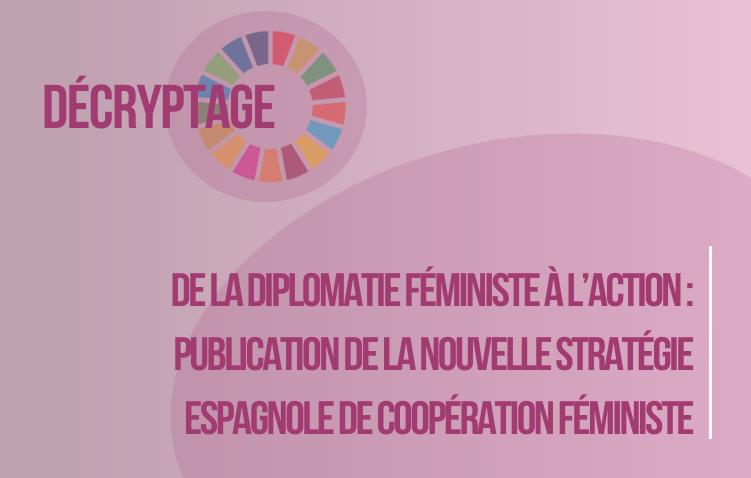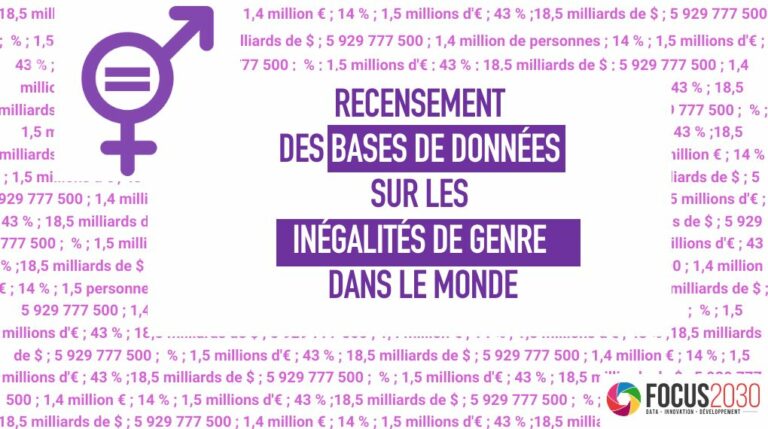Feminist foreign policy: where do France, Spain and Italy stand? Summary of the latest Gender in Geopolitics Institute report
Publié le 04/03/2024, modifié le 05/03/2024.
In a new report, the Gender in Geopolitics Institute analyzes the foreign policies of three countries – France, Spain and Italy – with regard to their commitment to gender equality. What conclusions can be drawn from this new form of state commitment to promote women’s rights and gender equality worldwide? Discover our analysis.
|
Special edition on the state of gender inequality around the world in 2024 : This overview, focusing on the access to contraception around the world, is one of the components of a special report dedicated to gender inequalities around the world in 2024. |
Global crises have highlighted the importance of feminist foreign policies in achieving gender equality and reducing social and economic inequalities. Indeed, girls and women are still the first victims of the upheavals that have occurred worldwide over the past five years: the consequences of the Covid-19 pandemic have set the achievement of equality a generation back, armed conflicts and climate change have also reinforced existing inequalities.
Yet, women are both a part of the solution and key players in achieving the Sustainable Development Goals adopted by the United Nations in 2015. The concept of “feminist foreign policy” or “feminist diplomacy” also seeks to establish a new approach based on collective responsibility and cooperation to achieve gender equality.
Following Sweden in 2014, fifteen countries have officially adopted a feminist foreign policy, including France and Spain. However, other heads of state and government choose to promote traditionalist and conservative values through their foreign policy, following the example of Italy.
The report, « Spain, France, and Italy – France, Italy, and Spain, commitments to promote feminism in their foreign policy? » examines the adoption of feminist foreign policies by country, their context, their specificities, their funding and their strengths and weaknesses under the form of country fact sheets. The report also makes recommendations to encourage governments to improve their feminist foreign policies. The aim of the IGG is to raise awareness among experts and civil society of the importance of gender equality in foreign policy-making.
France’s feminist diplomacy : an innovative foreign policy with unclear means
A major thrust of France’s feminist diplomacy strategy (2018-2022) focuses on sexual and reproductive health and rights (2023-2025), as underlined by its commitment to the “Freedom to dispose of one’s body and SRHR” coalition of the Generation Equality Forum organized in 2021.
To support these initiatives, France has increased the budget of its support fund for feminist organizations (FSOF) to 250 million euros over 5 years (2023-2027). French feminist diplomacy, officially launched in 2019 at the G7 Summit in Biarritz, adopts a cross-cutting approach, integrating the fight for women’s rights in various sectors such as climate, sexual and reproductive rights, education, the fight against gender-based violence and education.
These efforts position France as a key actor in the promotion of gender equality worldwide. France is currently drafting a new international strategy for gender equality, scheduled for publication in the second half of 2024.
However, according to the IFF report, this diplomacy is limited by the absence of an official definition and a detailed logical framework, compromising its legitimacy and accurate assessment. According to the authors, the current political support is still too weak, and a more robust defense of this foreign policy would therefore be necessary at international level, particularly within the European Union, where concerns about “backlash” are growing. Moreover, the absence of a dedicated and transparent budget makes it difficult to distinguish funds allocated specifically to gender equality. To maximize the effectiveness of this feminist foreign policy strategy, France should broaden its cross-cutting approach, integrating sectors currently absent such as the environment, trade, digital, migration and disarmament. Finally, insufficient collaboration with the private sector and research, and a lack of coordination between feminist diplomacy and the LGBTI+ strategy, reduce the potential of these initiatives.
The case of Spain: a two-speed approach to national and international feminist policies
Spain committed to a feminist foreign policy in 2020 and adopted an action plan for 2023-2024, covering various sectors such as security, health, climate, political representation, trade and the fight against gender-based violence. Spain has adopted significant national measures against gender-based violence and laws to promote parity.
Nevertheless, the IGG report highlights a gap between domestic and international measures, and difficulties in monitoring the implementation of Spain’s commitments. For example, the share of official development assistance allocated to gender equality declined from 53% to 37% between 2020 and 2021. The IGG makes a number of recommendations for moving from words to deeds, including the creation of a dedicated inter-ministerial working committee and the reinforcement of the intersectional aspect of policy.
In Italy, xenophobic and conservative policies reinforce the low profile of gender equality.
Italy, governed by a far-right coalition since 2022, shows notable regressions in the rights of women and LGBTI+ minorities, with a government that is predominantly “masculinist, conservative, homophobic and xenophobic”. While Italy has not committed itself to a feminist foreign policy, it has put in place a national strategy for gender equality (2021-2025) focused on reducing disparities in the world of work. Italy has made a significant contribution to the Sustainable Energy Fund for Africa, promoting gender equality.
However, the new national plan for the Women, Peace and Security Agenda (2020-2024) is compromised by the government’s anti-migration policy, which exacerbates the vulnerability of migrant people in the Mediterranean, particularly women. In addition, the share of Italian ODA allocated to gender equality has fallen by 8 percentage points between 2019 (42%) and 2021 (34%). To promote equality in Italy’s domestic and foreign policies, the IGG recommends, among other things, the full inclusion of gender equality in the government’s global action themes, the adoption of measures to improve the living conditions of LGBTI+ people, and an increase in the country’s contributions to UN agencies with gender-sensitive programs.
Find out more about Italy’s action on gender equality at G7 2024.
Conclusions
The Gender in Geopolitics Institute’s report underlines the importance of developing and mainstreaming feminist foreign policies to support development and contribute to sustainable, inclusive world peace. To achieve this, concrete commitments on the part of national governments seem indispensable. An analysis of the measures adopted by France and Spain in the field of gender equality shows that progress has been made, although shortcomings remain, particularly with regard to the coherence of domestic and foreign policies. Italy in particular illustrates the dangers of rising nationalism and conservatism in Europe, according to the authors. Finally, the report calls on the European Union to help harmonize and promote committed feminist foreign policies among its member states.











